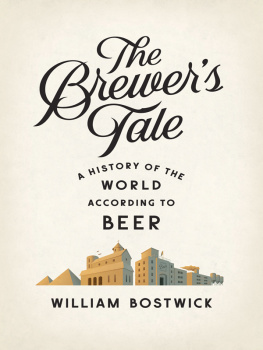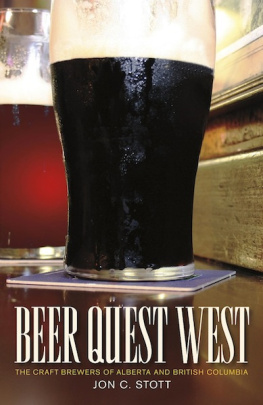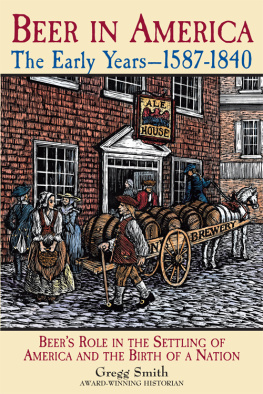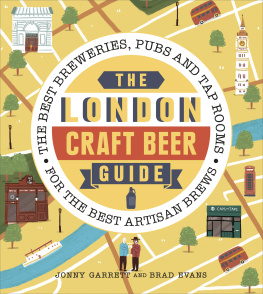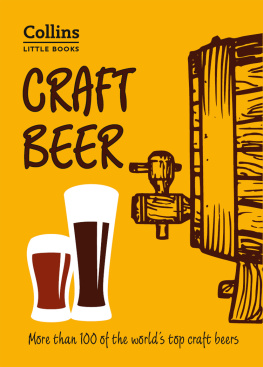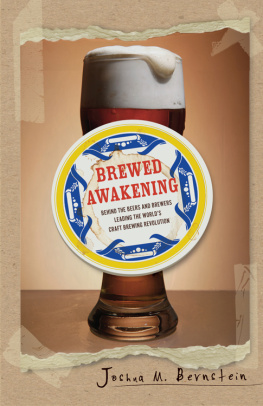
ALSO BY WILLIAM BOSTWICK
Beer Craft: A Simple Guide to Making Great Beer
THE
BREWERS
TALE
A History of the World According to Beer
William Bostwick

Copyright 2014 by William Bostwick
All rights reserved
First Edition
Lines from the Hymn to Ninkasi translated by Miguel Civil.
Permission granted courtesy of the Oriental Institute of the
University of Chicago.
For information about permission to reproduce selections from this book, write to Permissions, W. W. Norton & Company, Inc.,
500 Fifth Avenue, New York, NY 10110
For information about special discounts for bulk purchases, please contact W. W. Norton Special Sales at specialsales@wwnorton.com or 800-233-4830
Book design by Daniel Lagin
Production manager: Devon Zahn
The Library of Congress has cataloged the printed edition as follows:
Bostwick, William, author.
The brewers tale : a history of the world according to beer / William Bostwick.First edition.
pages cm
Includes bibliographical references and index.
ISBN 9780393239140 (hardcover)
1. BrewingHistory. 2. BeerHistory. I. Title.
TP573.A1B67 2014
663.4209dc23
2014016561
ISBN 978-0-393-24598-1 (e-book)
W. W. Norton & Company, Inc.,
500 Fifth Avenue, New York, N.Y. 10110
www.wwnorton.com
W. W. Norton & Company Ltd., Castle House,
75/76 Wells Street, London W1T 3QT
My senses arent above reproach, but theyre all I have. I want to see the whole pictureas nearly as I can. I dont want to put on the blinders of good and bad, and limit my vision. If I used the term good on a thing Id lose my license to inspect it, because there might be bad in it. Dont you see? I want to be able to look at the whole thing.
John Steinbeck, In Dubious Battle
A guy walks into a bar. Its the oldest setup there is. But what happens next?
I was at my local pub contemplating a water-ringed beer list, a wall of tap handles, and a packed fridge. I saw a pale ale brewed 20 million gallons at a time and a triple IPA made in a jerry-rigged turkey frier in a garage down the street. I saw a traditional, light-bodied British porter and an extra-strong, cacao-infused imperial stout stored in bourbon barrels. One beer was brewed with hours-old hops, freshly plucked in an Oregon field; another had been aged for eighteen months with acidic bacteriacritters more common in vinegar and pickle brines. There were pilsners and ambers, red ales and browns, wheat beers and rye beers and spelt beers; there were three-dollar happy hour specials and thirty-dollar vintage bottles, corked and foil-wrapped like fine Champagne. Bitter or sweet, smooth or strong, fruity or dry, dark or light, it was all there, in dizzying glory. Sothe bartender tapped his fingerswhatll it be?
This should have been an easy choice. I was in my element, after all. Drinking is my job. Im a beer critic. I cover beer for the Wall Street Journal and a few food and style glossies. That means when I drink Im on duty. I put on blinders to context, story, and place. I tune out the ads, cover up the label, and focus as best I can on taste alone. My job is to translate flavor to prose, not to wonder why but to describe, clearly, what . That is, what does the beer taste like and, most important for my readers, is it any good? Im a guide, a personal shopper. My palate is sensitive, my thesaurus well thumbed. I can flag a dirty tap line, I can distinguish tropical Calypso hops from citrusy Cascades. To me, beer is more than dry or sweet, strong or light. Not simply dark, but smoky like a campfire in a eucalyptus grove. Not just fruity, but tropically spiced like a papaya ripening in pine boughs.
Theres joy in leveling judgment, sure, but I get more kicks in the describing. Flavors are rich, and its fun to write about them, turning tastes into poetry. But staring at those taps, and my spreadsheets of tasting notes, I felt I was missing a deeper story. In my hunt for objectivity I was, ironically, getting too abstract. In ignoring context I was missing meaning. I wanted to know more than tasteI wanted to know its origins. I was done with the what . I wanted to know the where and why . Why does beer taste the way it does? Whence that papaya? Where did those styles, those flavorswhere did beer itselfcome from in the first place?
I knew that beer has been here as long as we have. What to drink? I shouldnt have been embarrassed I didnt have a good answer. Weve been asking ourselves that question for ten thousand years. Humankind was built on beer. From the worlds first writing to its first laws, in rituals social, religious, and political, civilization is soaked in beer. Some historians even think that beer gave us the crucial vitamins and nutrientsnot to mention a source of purified waterto keep us healthy as we turned from meat-centric nomads to a settled, agrarian diet. Beer was foundational stuff, a building block of human existence. But while so much else has changed, oxen to John Deeres, wood hearths to nuclear reactors, beer has remained. How has it lasted so long, I wondered. How has it evolved, and how has it stayed the same?
What we drink says something about us, from the guy who bellied up next to me at the bar and whispered for the bitterest IPA they had, sheepishly, as if asking for the fattiest foie gras, to the folks who recoil at the thought of anything hoppedor, as my mom calls it, flavorful. I just want something light, she says. Some beers are revered like wines, calling drinkers on pilgrimages to Belgium just to get a taste; other are hawked on NASCAR billboards and slugged by keg-standing bros. Ever since weve been asking ourselves whats for dinner, weve also been asking what to drink with it. And its never been an easy question to answer, even for our ancestors. Babylonian tablets recorded twenty kinds: black, red, sweet, even beer to lessen the waist. Egyptians had rough-hewn peasant beer and beer flavored with dates and honey for the pharaohs. Dark-age tribes had spice cabinets full of henbane, ergot, and other bog-grown oddities. What we drink reveals who we are. Can it also tell me who we were?
So I kicked aside my style guidesI shut my thesaurus, I hung up my flavor wheeland hit the history books. I traced those tap lines back to their sources. I followed IPAs into the holds of Calcutta-bound Indiamen; goblets of strong Belgian beer back to spartan tables in drafty monasteries; peppery saisons to hot days on Wallonian farms; and beer itself back, back through the murk to the beginning of time.
I couldnt just read about the beer, of course. Id have to taste it. Which meant Id have to make it myself. As lengthy as the bars tap list was, I didnt see any henbane on it. To brew these beers I needed a guide. I was looking, after all, not just for a taste but for a story; I needed not just the beer but the brewer.
Because if beers essence can be distilled to one idea, its this: beer is made . Our first recorded recipes were for beer because beer was the first thing we made that required a recipe, our first engineered food. Wine, for example, just happens. A grapes sugars will ferment on their own, without a human touch; even elephants and butterflies seek out rotting fruit. But grain needs a modern hand to coax out its sugars and ferment them into alcohol. Brewing beer demands thought and skill. It demands, in a word, a creator.
As beer says something about the drinker and his tastes, it also reflects the man (or, more often, in the past, woman) who made it. Those tap lines trace back to a person. And so I couldnt just drink the beerId have to cross over to the other side of the bar, to meet the Babylonian temple worker, the Medieval alewife, the monks and farmers, industrialists and immigrants who first brewed the beers over which I pondered.
Next page
